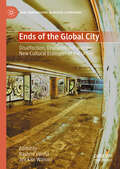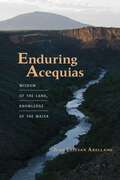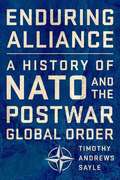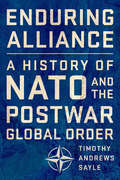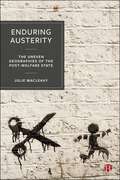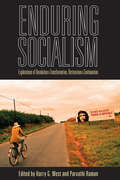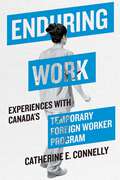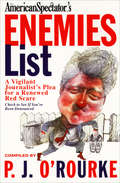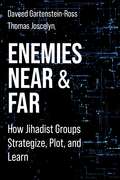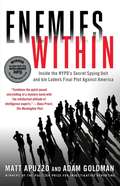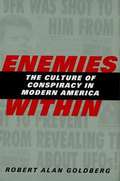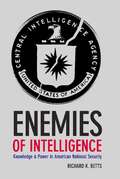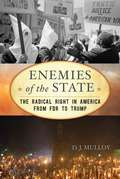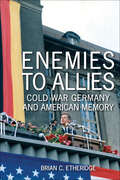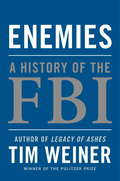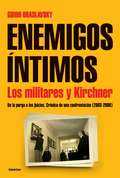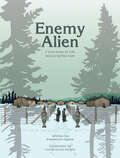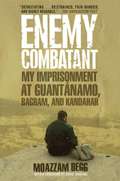- Table View
- List View
Ends of the Global City: Disaffection, Displacement and the New Cultural Ecologies of the Urban (New Comparisons in World Literature)
by Jini Kim Watson Rashmi VarmaThis volume of essays explores how the global city is confronting new forms of crises and disruption. Examining cities in the Caribbean, North America, Africa, the Persian Gulf, Asia and Australia, the essays use literary and cultural analysis to examine the pasts, present and futures of the global city. Ranging from the period of high postcolonial development, industrialization and compacted modernization to present-day neoliberal urban planning, the collection considers arrivals and departures in the global city, offering new critical vocabularies to analyse ongoing processes of migration, economic immiseration, and environmental collapse.
Endure (Need Pixies #4)
by Carrie JonesRescuing Nick should have made all of Zara's problems disappear. Bedford's greatest warrior is back, not to mention Zara's true soul mate. But it seems it isn't enough. Nick isn't enough. Bedford is being ravaged by evil pixies and they need much more than one great warrior; they need an army to stop the impended apocalypse. Zara isn't sure what her role is anymore. She's not just fighting for her friends, she's also a pixie queen. And to align her team of pixies with the humans she loves will be one of her greatest battles yet. Especially since she can't even reconcile her growing, heart-pounding feelings for her pixie king.... Unexpected turns, surprising revelations, and one utterly satisfying romantic finale make Endure a thrilling end to this acclaimed series.
Enduring Acequias: Wisdom of the Land, Knowledge of the Water (Querencias Series)
by Juan Estevan ArellanoFor generations the Río Embudo watershed in northern New Mexico has been the home of Juan Estevan Arellano and his ancestors. From this unique perspective Arellano explores the ways people use water in dry places around the world. Touching on the Middle East, Europe, Mexico, and South America before circling back to New Mexico, Arellano makes a case for preserving the acequia irrigation system and calls for a future that respects the ecological limitations of the land.
Enduring Alliance: A History Of Nato And The Postwar Global Order
by Timothy Andrews SayleBorn from necessity, the North Atlantic Treaty Organization (NATO) has always seemed on the verge of collapse. Even now, some seventy years after its inception, some consider its foundation uncertain and its structure weak. At this moment of incipient strategic crisis, Timothy A. Sayle offers a sweeping history of the most critical alliance in the post-World War II era. In Enduring Alliance, Sayle recounts how the western European powers, along with the United States and Canada, developed a treaty to prevent encroachments by the Soviet Union and to serve as a first defense in any future military conflict. As the growing and unruly hodgepodge of countries, councils, commands, and committees inflated NATO during the Cold War, Sayle shows that the work of executive leaders, high-level diplomats, and institutional functionaries within NATO kept the alliance alive and strong in the face of changing administrations, various crises, and the flux of geopolitical maneuverings. Resilience and flexibility have been the true hallmarks of NATO. As Enduring Alliance deftly shows, the history of NATO is organized around the balance of power, preponderant military forces, and plans for nuclear war. But it is also the history riven by generational change, the introduction of new approaches to conceiving international affairs, and the difficulty of diplomacy for democracies. As NATO celebrates its seventieth anniversary, the alliance once again faces challenges to its very existence even as it maintains its place firmly at the center of western hemisphere and global affairs.
Enduring Alliance: A History of NATO and the Postwar Global Order
by Timothy Andrews SayleBorn from necessity, the North Atlantic Treaty Organization (NATO) has always seemed on the verge of collapse. Even now, some seventy years after its inception, some consider its foundation uncertain and its structure weak. At this moment of incipient strategic crisis, Timothy A. Sayle offers a sweeping history of the most critical alliance in the post-World War II era. In Enduring Alliance, Sayle recounts how the western European powers, along with the United States and Canada, developed a treaty to prevent encroachments by the Soviet Union and to serve as a first defense in any future military conflict. As the growing and unruly hodgepodge of countries, councils, commands, and committees inflated NATO during the Cold War, Sayle shows that the work of executive leaders, high-level diplomats, and institutional functionaries within NATO kept the alliance alive and strong in the face of changing administrations, various crises, and the flux of geopolitical maneuverings. Resilience and flexibility have been the true hallmarks of NATO.As Enduring Alliance deftly shows, the history of NATO is organized around the balance of power, preponderant military forces, and plans for nuclear war. But it is also the history riven by generational change, the introduction of new approaches to conceiving international affairs, and the difficulty of diplomacy for democracies. As NATO celebrates its seventieth anniversary, the alliance once again faces challenges to its very existence even as it maintains its place firmly at the center of western hemisphere and global affairs.
Enduring Austerity: The Uneven Geographies of the Post-Welfare State
by Julie MacLeavyLooking at how austerity has become embedded in institutional practices, this book offers new critical insights into the uneven geographies created by austerity. Reflecting on the spatially and socially uneven impacts of austerity on individuals and families, Julie MacLeavy shows how the ‘new normal’ of post-welfare state governance will negatively condition life chances, even in better economic times. She considers the political, economic and social developments that have led us to the present moment and shows how the rhetoric of austerity has pushed social inequality and uneven development off the political agenda.
Enduring Democracy (CTC Custom Fourth Edition)
by Central Texas CollegeThe Enduring Democracy looks at how problems and controversies characterizing American government today have been successfully tackled in America's past, and it examines how changing demographics of America have affected its political landscape.
Enduring Empire
by David Tabachnick Toivo KoivukoskiAn exploration of the ways in which ancient theories of empire can inform our understanding of present-day international relations, Enduring Empire engages in a serious discussion of empire as it relates to American foreign policy and global politics. The imperial power dynamics of ancient Athens and Rome provided fertile ground for the deliberations of many classical thinkers who wrote on the nature of empire: contemplating political sovereignty, autonomy, and citizenship as well as war, peace, and civilization in a world where political boundaries were strained and contested. The contributors to this collection prompt similar questions with their essays and promote a serious contemporary consideration of empire in light of the predominance of the United States and of the doctrine of liberal democracy.Featuring essays from some of the leading thinkers in the fields of political science, philosophy, history, and classics, Enduring Empire illustrates how lessons gleaned from the Athenian and Roman empires can help us to understand the imperial trajectory of global politics today.
Enduring Rivalries in the Asia-Pacific
by Steve ChanEnduring rivalries recurrently ensnare states in militarized disputes and wars. Are they poised to intensify in the Asia-Pacific, a region characterized by regime and cultural differences, territorial contests, and competing nationalist and regime claims? It is often argued that these conditions and recent power shifts are likely to lead to conflict escalation and contagion, especially in Sino-American relations. Steve Chan's book challenges this common view and argues instead that Asia-Pacific rivalries are likely to be held in abeyance. He suggests that the majority of leaders in the region wish to base their political legitimacy on their economic performance rather than popular mobilization against foreign enemies. Economic interdependence and political multilateralism have restrained and in some cases reversed rivalries. Although Asia-Pacific states will continue to quarrel, Chan argues that their relations are more stable today than at any other time since 1945.
Enduring Socialism: Explorations of Revolution and Transformation, Restoration and Continuation (Berghahn Ser.)
by Harry G. West Parvathi RamanAgainst the historical backdrop of successive socialist and post-socialist claims to have completely remade society, the contributors to this volume explore the complex and often paradoxical continuities between diverse post-socialist presents and their corresponding socialist and pre-socialist pasts. The chapters focus on ways in which: pre-socialist economic, political, and cultural forms in fact endured an era of socialism and have found new life in the post-socialist present, notwithstanding revolutionary socialist claims; continuities with a pre-socialist past have been produced within the historical imaginary of post-socialism; and socialist economic, political, and cultural forms have in fact endured in a purportedly postsocialist era, despite the claims of neo-liberal reformers.
Enduring Work: Experiences with Canada’s Temporary Foreign Worker Program
by Catherine E. ConnellyIf you believed most of what’s said about the Canadian Temporary Foreign Worker program, you might naturally assume that there is a trade-off between workers’ poor experiences with the program and employers’ significant benefits. In reality, the experiences of workers are far worse than is commonly acknowledged, while employers are not reaping as much benefit as the public might suppose.In Enduring Work Catherine Connelly draws on over one hundred interviews with people connected to different aspects of this program, analyzing their experiences from the perspective of organizational behaviour and human resources management. She compares the lived reality of agricultural workers, in-home caregivers, and low- and high-wage workers, showing how and why each group is vulnerable to mistreatment, albeit in different ways. She further explores how employment agencies and immigration consultants contribute to program abuses. Critically, Enduring Work provides the perspectives of employers, distinguishing between the reluctant users of the program who follow the rules and the reckless users who do not.Groundbreaking in its analysis of an issue very much in the news, Enduring Work unpacks the harms within Canada’s Temporary Foreign Worker program and offers nuanced strategies to improve it.
Endö Shüsaku: A Literature of Reconciliation (Nissan Institute/Routledge Japanese Studies)
by Mark B. WilliamsEndö Shüsaka is probably the most widely translated of all Japanese authors. In this first major study of Endö's works, Mark Williams moves the discussion on from the well-worn depictions of Endö as the 'Japanese Graham Greene', and places him in his own political and cultural context.
Enemies List: A Vigilant Journalist's Plea for a Renewed Red Scare
by P. J. O'Rourke<p>Written with the same acerbic wit and infectious humor that has made P. J. O'Rourke one of the most popular political satirists of all time, The Enemies List will keep you howling and his enemies scowling. From Noam Chomsky to Yoko Ono, from Peter, Paul, and Mary (yes, they're still alive) to all the people who think quartz crystals cure herpes, from Ralph Nader to the entire country of Sweden, P. J. O'Rourke has created a roster of the most useless, politically disgraceful, and downright foolish people around. <p>Although a rating system of S=Silly, VS=Very Silly, SML=Shirley MacLaine was ultimately cast aside, the distinguishing feature of the cluster of dunces presented here is silliness, not political subversion. The Enemies List began as an article in the American Spectator and, as readers contributed their own suggestions, quickly grew into a hilarious and slashing commentary on politicians and celebrities alike. Now they have been named, we just need to figure out what to do with them. </p>
Enemies Near and Far: How Jihadist Groups Strategize, Plot, and Learn (Columbia Studies in Terrorism and Irregular Warfare)
by Thomas Joscelyn Daveed Gartenstein-RossAlthough the United States has prioritized its fight against militant groups for two decades, the transnational jihadist movement has proved surprisingly resilient and adaptable. Many analysts and practitioners have underestimated these militant organizations, viewing them as unsophisticated or unchanging despite the ongoing evolution of their tactics and strategies.In Enemies Near and Far, two internationally recognized experts use newly available documents from al-Qaeda and ISIS to explain how jihadist groups think, grow, and adapt. Daveed Gartenstein-Ross and Thomas Joscelyn recast militant groups as learning organizations, detailing their embrace of strategic, tactical, and technological innovation. Drawing on theories of organizational learning, they provide a sweeping account of these groups’ experimentation over time. Gartenstein-Ross and Joscelyn shed light on militant groups’ most effective strategic and tactical moves, including attacks targeting aircraft and the use of the internet to inspire and direct lone attackers, and they examine jihadists’ ability to shift their strategy based on political context. While militant groups’ initial efforts to upgrade their capabilities often fail, these attempts should generally be understood not as failures but as experiments in service of a learning process—a process that continues until these groups achieve a breakthrough.Providing unprecedented historical and strategic perspective on how jihadist groups learn and evolve, Enemies Near and Far also explores how to anticipate future threats, analyzing how militants are likely to deploy a range of emerging technologies.
Enemies Within
by Adam Goldman Matt ApuzzoTwo Pulitzer Prize-winning journalists take an unbridled look into one of the most sensitive post-9/11 national security investigations, a breathtaking race to avert a second devastating terrorist attack on American soil.For Americans who wonder, "How safe are we?" Matt Apuzzo and Adam Goldman pull back the curtain to reveal the strengths and weaknesses of our counterterrorism measures. Chillingly, their real-life domestic spy story--based on hundreds of previously unpublished New York Police Department internal memos and exclusive interviews with intelligence sources--indicates that many of those strategies aren't even close to being useful, functional, or successful. Six months after the 9/11 attacks, New York Police Commissioner Ray Kelly initiated a straightforward, yet audacious, antiterrorist plan to be implemented in the Big Apple. The NYPD would dispatch a vast network of undercover officers and informants--known as "mosque crawlers" and "rakers"--into Muslim neighborhoods to eavesdrop on conversations in mosques and community centers. And yet their shady tactics proved to be fruitless. Through the harrowing tick-tock narrative of forty-eight hours in 2009, the NYPD and the FBI track suspected terrorist Najibullah Zazi--the single greatest threat to US domestic security since 9/11--as he makes his way from Denver to New York to launch an attack. In telling their story, the authors provide readers an inside look at the complex and often contradictory state of counterterrorism and intelligence in America. Enemies Within answers the tough questions about the effectiveness of the measures we take to protect ourselves from real and false threats. Its shocking details about the tactics and activities of the NYPD will be headline news and reveal what it really takes to hunt down terrorists in America.
Enemies Within: The Culture of Conspiracy in Modern America
by Robert Alan Goldberg"There is a hunger for conspiracy news in America. Hundreds of Internet websites, magazines, newsletters, even entire publishing houses, disseminate information on invisible enemies and their secret activities, subversions, and coverups. Those who suspect conspiracies behind events in the news - the crash of TWA Flight 800, the death of Marilyn Monroe - join generations of Americans, from the colonial period to the present day, who have entertained visions of vast plots. In this book Robert Goldberg focuses on five major conspiracy theories of the past half-century, examining how they became widely popular in the United States and why they have remained so. "--BOOK JACKET. Title Summary field provided by Blackwell North America, Inc. All Rights Reserved
Enemies of Intelligence: Knowledge and Power in American National Security
by Richard BettsThe tragic events of September 11, 2001, and the false assessment of Saddam Hussein's weapons arsenal were terrible reminders that good information is essential to national security. These failures convinced the American public that their intelligence system was broken and prompted a radical reorganization of agencies and personnel, but as Richard K. Betts argues in this book, critics and politicians have severely underestimated the obstacles to true reform. One of the nation's foremost political scientists, Betts draws on three decades of work within the U.S. intelligence community to illuminate the paradoxes and problems that frustrate the intelligence process. Unlike America's efforts to improve its defenses against natural disasters, strengthening its strategic assessment capabilities means outwitting crafty enemies who operate beyond U.S. borders. It also requires looking within to the organizational and political dynamics of collecting information and determining its implications for policy. Combining academic research with personal experience, Betts outlines strategies for better intelligence gathering and assessment. He describes how fixing one malfunction can create another; in what ways expertise can be both a vital tool and a source of error and misjudgment; the pitfalls of always striving for accuracy in intelligence, which in some cases can render it worthless; the danger, though unavoidable, of "politicizing" intelligence; and the issue of secrecy-when it is excessive, when it is insufficient, and how limiting privacy can in fact protect civil liberties. Betts argues that when it comes to intelligence, citizens and politicians should focus less on consistent solutions and more on achieving a delicate balance between conflicting requirements. He also emphasizes the substantial success of the intelligence community, despite its well-publicized blunders, and highlights elements of the intelligence process that need preservation and protection. Many reformers are quick to respond to scandals and failures without detailed, historical knowledge of how the system works. Grounding his arguments in extensive theory and policy analysis, Betts takes a comprehensive and realistic look at how knowledge and power can work together to face the intelligence challenges of the twenty-first century.
Enemies of Intelligence: Knowledge and Power in American National Security
by Richard K. BettsThe tragic events of September 11, 2001, and the false assessment of Saddam Hussein's weapons arsenal were terrible reminders that good information is essential to national security. These failures convinced the American public that their intelligence system was broken and prompted a radical reorganization of agencies and personnel, but as Richard K. Betts argues in this book, critics and politicians have severely underestimated the obstacles to true reform. One of the nation's foremost political scientists, Betts draws on three decades of work within the U.S. intelligence community to illuminate the paradoxes and problems that frustrate the intelligence process. Unlike America's efforts to improve its defenses against natural disasters, strengthening its strategic assessment capabilities means outwitting crafty enemies who operate beyond U.S. borders. It also requires looking within to the organizational and political dynamics of collecting information and determining its implications for policy. Combining academic research with personal experience, Betts outlines strategies for better intelligence gathering and assessment. He describes how fixing one malfunction can create another; in what ways expertise can be both a vital tool and a source of error and misjudgment; the pitfalls of always striving for accuracy in intelligence, which in some cases can render it worthless; the danger, though unavoidable, of "politicizing" intelligence; and the issue of secrecy - when it is excessive, when it is insufficient, and how limiting privacy can in fact protect civil liberties. Betts argues that when it comes to intelligence, citizens and politicians should focus less on consistent solutions and more on achieving a delicate balance between conflicting requirements. He also emphasizes the substantial success of the intelligence community, despite its well-publicized blunders, and highlights elements of the intelligence process that need preservation and protection. Many reformers are quick to respond to scandals and failures without detailed, historical knowledge of how the system works. Grounding his arguments in extensive theory and policy analysis, Betts takes a comprehensive and realistic look at how knowledge and power can work together to face the intelligence challenges of the twenty-first century.
Enemies of the Permanent Things
by Russell KirkIn the 1960s, Russell Kirk lectured and debated on many college campuses, ably defending traditional ideas against various liberal and radical adversaries. Enemies of the Permanent Things, first published in 1969, is the most significant extended meditation on culture and politics to come out of the rough and tumble of those years. As such, it is an invaluable document, articulating the response of a critical witness to the radically anti-authoritarian turn taken by the intellectual elite in that destructive decade. Kirk defines “the permanent things” (a phrase borrowed from T. S. Eliot) as the unchanging norms of human nature. In a healthy society, Kirk argues, individuals will attempt to live by these permanent standards of moral action, and the laws of the land will give support to citizens as they make that attempt. Focusing on literature as well as on politics, Kirk sets forth and defends those inalterable truths of human life.
Enemies of the State: The Radical Right in America from FDR to Trump (The American Ways Series)
by D. J. MulloyThe rise of the alt-right alongside Donald Trump’s candidacy may be seem unprecedented events in the history of the United States, but D. J. Mulloy shows us that the radical right has been a long and active part of American politics during the twentieth century. From the German-American Bund to the modern militia movement, D. J. Mulloy provides a guide for anyone interested in examining the roots of the radical right in the U.S.—in all its many varied forms—going back to the days of the Great Depression, the New Deal and the extraordinary political achievements of Franklin D. Roosevelt. <p><p> Enemies of the State offers an informative and highly readable introduction to some of the key developments and events of recent American history including: the fear of the Communist subversion of American society in the aftermath of the Second World War; the rise of the civil rights movement and the “white backlash” this elicited; the apparent decline of liberalism and the ascendancy of conservatism during the economic malaise of the 1970s; Ronald Reagan’s triumphant presidential victory in 1980; and the Great Recession of 2007-08 and subsequent election of President Obama.
Enemies to Allies: Cold War Germany and American Memory (Studies In Conflict, Diplomacy, And Peace Ser.)
by Brian C. Etheridge“Addresses a compelling and fascinating feature of the Cold War Era, namely the rapid reversal of America’s alliance relationships after World War II.” —Thomas A. Schwartz, coeditor of The Strained AllianceAt the close of World War II, the United States went from being allied with the Soviet Union against Germany to alignment with the Germans against the Soviet Union—almost overnight. While many Americans came to perceive the German people as democrats standing firm with their Western allies on the front lines of the Cold War, others were wary of a renewed Third Reich and viewed all Germans as nascent Nazis bent on world domination. These adversarial perspectives added measurably to the atmosphere of fear and distrust that defined the Cold War.In Enemies to Allies, Brian C. Etheridge examines more than one hundred years of American interpretations and representations of Germany. With a particular focus on the postwar period, he demonstrates how a wide array of actors—including special interest groups and US and West German policymakers—employed powerful narratives to influence public opinion and achieve their foreign policy objectives. Etheridge also analyses bestselling books, popular television shows such as Hogan’s Heroes, and award-winning movies such as Schindler’s List to reveal how narratives about the Third Reich and Cold War Germany were manufactured, contested, and co-opted as rival viewpoints competed for legitimacy.This groundbreaking study draws from theories of public memory and public diplomacy to demonstrate how conflicting US accounts of German history serve as a window for understanding not only American identity, but international relations and state power.“A masterful combination of diplomatic and cultural history.” —Stewart Anderson, Brigham Young University
Enemies: A History of the FBI
by Tim WeinerEnemies is the first definitive history of the FBI's secret intelligence operations, from an author whose work on the Pentagon and the CIA won him the Pulitzer Prize and the National Book Award. We think of the FBI as America's police force. But secret intelligence is the Bureau's first and foremost mission. Enemies is the story of how presidents have used the FBI as the most formidable intelligence force in American history. Here is the hidden history of America's hundred-year war on terror. The FBI has fought against terrorists, spies, anyone it deemed subversive--and sometimes American presidents. The FBI's secret intelligence and surveillance techniques have created a tug-of-war between protecting national security and infringing upon civil liberties. It is a tension that strains the very fabric of a free republic.From the Hardcover edition.
Enemigos íntimos: De la purga a los juicios. Crónica de una confrontación ( 2003-2008)
by Guido BraslavskyUn libro esencial para comprender la forma de ejercer el poder de uno delos presidentes de carácter más complejo que dio la Argentina de lasúltimas décadas. Guido Braslavsky, periodista especializado en temasmilitares, reconstruye la trama y los sucesos nunca revelados de estecapítulo clave de la historia argentina reciente. Mayo de 2003. Como consecuencia de una dramática transición desde lacrisis terminal del modelo económico de los noventa, Néstor Kirchner, unignoto gobernador patagónico, llega al gobierno con el 22 por ciento delos votos al bajarse Carlos Menem de la segunda vuelta electoral. En unpaís todavía no recuperado de la conmoción, con esa debilidad de origenhay quienes se atreven a vaticinarle un año en el cargo. Pero Kirchnerconstruye poder a pasos agigantados. Y su primera medida de gobierno esuna purga de mandos militares insospechada y sin precedentes, inicio deun período de profunda confrontación, atravesado por la decisiónpresidencial de impulsar la reapertura de las causas por violaciones alos derechos humanos.Como candidato, Kirchner mantuvo en secreto sus planes y luego delineóun rumbo que no solo sorprendió a los militares, sino también a muchossantacruceños, que lo habían tenido cuatro años como intendente de RíoGallegos y luego casi doce como gobernador, y nunca lo habían vistovincularse con las asociaciones por los derechos humanos como lo haríadesde la Casa Rosada. Para Kirchner, un paso insoslayable para acumularpoder y afectos de sectores progresistas, en una línea que perduraríacomo una de sus políticas más consecuentes.«Enemigos íntimos» relata la conflictiva relación de Kirchner con lasFuerzas Armadas, sobre la que edificó buena parte de su poder. Lapartida abrupta de Brinzoni, la llegada de Bendini y de una nueva cúpulacastrense. Gestos cargados de simbolismo como la decisión de retirar loscuadros de Videla y Bignone del Colegio Militar o exigir a la Armada laentrega de la ESMA para convertirla en un «Museo de la Memoria» de losmuertos y desaparecidos por la dictadura. La revulsión interna en lasfuerzas y el desafío de los grupos castrenses que reaccionaron frente alos juicios, en numerosos casos defendiendo la represión ilegal, altiempo que muchos militares de los años de plomo volvían a sentarse enel banquillo de los acusados.
Enemy Alien: A True Story of Life Behind Barbed Wire
by Kassandra LuciukThis graphic history tells the story of Canada’s first national internment operations through the eyes of John Boychuk, an internee held in Kapuskasing from 1914 to 1917. The story is based on Boychuk’s actual memoir, which is the only comprehensive internee testimony in existence. The novel follows Boychuk from his arrest in Toronto to Kapuskasing, where he spends just over three years. It details the everyday struggle of the internees in the camp, including forced labour and exploitation, abuse from guards, malnutrition, and homesickness. It also documents moments of internee agency and resistance, such as work slowdowns and stoppages, hunger strikes, escape attempts, and riots. Little is known about the lives of the incarcerated once the paper trail stops, but Enemy Alien subsequently traces Boychuk’s parole, his search for work, his attempts to organize a union, and his ultimate settlement in Winnipeg. Boychuk’s reflections emphasize the much broader context in which internment takes place. This was not an isolated incident, but rather part and parcel of Canadian nation building and the directives of Canada’s settler colonial project.
Enemy Combatant
by Moazzam Begg Victoria BrittainWhen Enemy Combatant was first published in the United States in hardcover in 2006 it garnered sensational reviews, and its author was featured in the New York Times, the Los Angeles Times, on National Public Radio, and on ABC News. A second generation British Muslim, Begg had been held by the U.S. military for more than three years before being released without charge in January of 2005. His memoir is the first published account by a Guantánamo detainee of life inside the infamous prison.Writing in the Washington Post Book World, Jane Mayer described Enemy Combatant as "fascinating . . . Begg provides some ideological counterweight to the one-sided spin coming from the U.S. government. He writes passionately and personally, stripping readers of the comforting lie that somehow the detainees aren't really like us, with emotional attachments, intellectual interests and fully developed humanity."Recommended by the Financial Times and Tikkun magazine and a ColorLines Editors' Pick of Post-9/11 Books, Enemy Combatant is "a forcefully told, up-to-the-minute political story . . . necessary reading for people on all sides of the issue" (Publishers Weekly, starred review).
